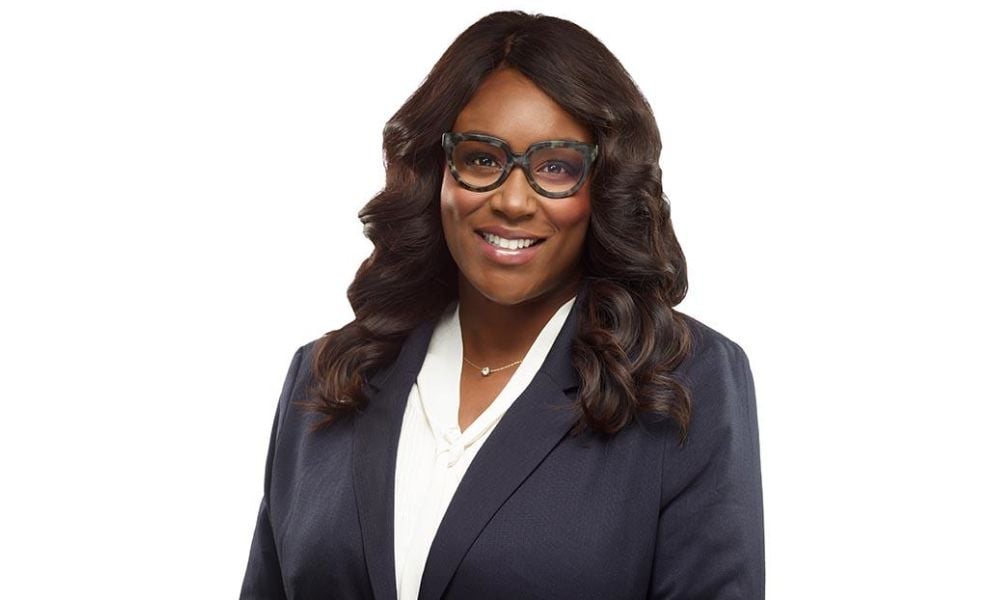The firm's chief inclusion officer will deliver the keynote address at Women in Law Summit Canada

Canadian Lawyer spoke with Charlene Theodore, chief inclusion officer at McCarthy Tétrault. Theodore will present the keynote address on February 16 at the Canadian Lawyer’s Women in Law Summit Canada on “Authentic leadership lessons.”
What does authentic leadership mean to you?
Ironically, the definition of authentic leadership has changed just as people were starting to embrace it within corporate Canada and the legal profession. Authentic leadership must now have a certain equity, diversity, and inclusion capacity.
What are the new leadership rules?
We need to recognize, now more than ever, that we need the best leaders for a broad and diverse variety of employees, people, partners, and stakeholders.
If you don’t understand what inclusion is and how it works in a corporate setting, it will impact your ability to be the leader that corporate Canada and the legal profession need right now. That applies to in-house or law firm settings, no matter how big your organization is. It ultimately impacts your organization’s success in the next 10, 15, or 25 years, or even how successful your law firm will be in the next recruiting cycle.
What is next for EDI in the Canadian legal profession?
The legal profession has made great strides in the inclusion of women, gender diversity, queer people, and racialized people. But have we done enough to meet the moment? If we had, we wouldn't be having these conversations right now.
Pre-pandemic, some firms would say that “EDI is important to our firm.” Post-pandemic, we expect firms to integrate it into their corporate business strategies. This integration means resourcing it the same way you would resource any other firm or corporate initiative.
Corporate Canada and the legal profession have responded by staffing up on people who do what I do, i.e., chief inclusion officers. But that is not enough. It is about choosing what you want to impact and getting people across departments and teams on board. Firms need to ensure that they integrate inclusive principles into their daily work.
How has the pandemic affected the ability of underrepresented groups to be more authentic?
The pandemic allowed us to recognize that what happens outside of work affects people's ability to show up at work and do great work. Everyone was impacted differently, but there was a commonality in our experience. Because of that, we saw the real life of different people.
Men in the workplace saw their female colleagues and the unique challenges they had with parenting and caregiving. Non-racialized lawyers saw up close what, for many Black lawyers, was a global experience, just navigating the world and trying to be professional.
What is your advice to lawyers from underrepresented groups about being authentic?
People are, or should be, increasingly receptive to authenticity. For these lawyers, finding your people and a place where you're valued and respected is essential. It's always great to have a mentor, even outside of your firm or the profession, who can offer a listening ear.
The real test is whether firms have the courage to give these people a chance to rise to the occasion.
Tell me about your work at McCarthy Tétrault
McCarthys has had the leading diversity strategy in the profession in Canada for several years. But we don't do it alone. We do it because we've engendered a culture of trust, where people have someone to speak to if they see something that the firm should address that bothers them that is not inclusive.
If there's something that we missed, we trust that our people will come to us and say it. That gives us a chance to rise to the occasion.
EDI involves a lot of change. Are law firms equipped for change management?
I have been saying this since I was the Ontario Bar Association president and since the pandemic: You already know how to do this. Law firms do change management all the time. Some of the biggest law firms wouldn't be here if they didn't understand change management.
When people say, “diversity and inclusion and change management,” they freeze up. This reaction comes when they are not confident with their EDI capacity. I always remind people that they have the skill for change management, even if they are not up to speed on all the nuances of inclusion and how to implement it.
If your law firm has a strong chief inclusion officer, that's someone who can help you get started on resources or strategy. If you haven't yet hired a chief inclusion officer, that would be your signal to bring someone on board, either as a consultant or permanently, to help figure this out.
How can law firms harness leadership development at all levels?
Look at your definition of leadership. Look beyond role or title.
We start instilling a sense of leadership in our people from day one. So, summer students view articling students as leaders. Articling students view first-year lawyers as leaders. Partners view practice group leaders as leaders, etc.
Once we build that leadership capacity, especially as firms become more diverse, we empower people to take ownership of the firm’s culture. Firms can add diverse voices to whatever great work they are doing.
At McCarthys, the leadership team made a firm commitment before inclusion was a big thing. Many of our leaders do not have lived experience with anti-Black racism, misogyny, or antisemitism. But they committed themselves to learn.
We still devote a lot of our inclusion resources to education. McCarthys understands that how we treat each other, pass each other in the hall, assign a file, and prepare for business meetings, directly impacts each person's lived experience.
*Answers have been edited for length and clarity.










